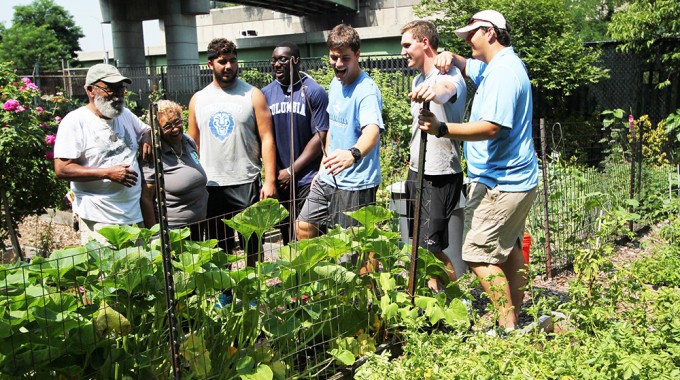If you know of a Columbia College student, faculty member, alumnus/alumna or program we should spotlight, or if you would like to submit a story, please contact:
Columbia College
Office of Communications
cc-comms@columbia.edu

“It’s great to get in touch with our new community.” —Connor Heeb CC’18
On mornings in July, a group of very large and fit Columbia students arrived on West 205th Street to spend their first days in New York with preschoolers. Towering over the four- and five-year-olds, a half dozen freshman football players—the shortest was 6 foot 3 inches—read stories to the children, helped them with arts and crafts, taught them the alphabet letter-by-letter, took them to the park and on field trips around the city.
“It’s great to get in touch with our new community,” said defensive lineman Connor Heeb CC’18, of Canandaigua, N.Y. “It’s a lot of work, but they’re so much fun to play with, so much fun to try to teach how to read. It’s absolutely a joy.” And, he adds, “It’s been a great experience for me and my teammates.”
Heeb is one of 34 freshmen football players spending their first summer in New York City working with local community groups and on campus as part of program designed to introduce them to life at an urban university. In addition to Heeb’s group, which spent its time at Operation Exodus in Inwood, other teams spent the month chaperoning field trips for middle-schoolers; working in a community garden and improving Riverside Park; helping Columbia’s Office of Environmental Stewardship to boost the University’s recycling; creating databases for archival materials and staffing Dodge Fitness Center.
The program is the brainchild of Head Football Coach Pete Mangurian, who wanted his newest players to have an experience that would help them grow not only as students and teammates, but as citizens of their new Upper Manhattan community.
“A lot of these guys are from much different places than New York City,” said Mangurian, who is in his third year as coach. “It’s a life lesson to learn how to interact a little outside your comfort zone. One of the positives is they become more familiar with Columbia and the people here. This is a win-win situation for everybody involved and that’s what makes it so unique.”
Three years ago Mangurian began working together with Columbia Facilities and other offices to create the Football Community Engagement Summer Project, which aims to develop a unique program that put service-learning at the center of the new players’ first weeks as New Yorkers.
“One month living in New York City working alongside all of our wonderful neighbors, alongside the Columbia community, you start to understand what it means to be a leader,” said La-Verna Fountain, Columbia’s vice president for construction business services and communications, who helped design the program. “I think it will show up on the field and it also means, more importantly, they’re going to be leaders on campus and in the community.”
Matt Mahoney, executive director of Operation Exodus, said that the athletes’ help with his group’s pre-K classes provided a level of one-on-one learning and attention that the children in the program don’t often have. “Some of these kids are not used to sitting down with someone reading them a book,” he said. “This does huge things for literacy and reading comprehension.”
At Riverside Park, another team worked with Jennie Benitez, an 83-year-old volunteer who has been managing a community garden in the neighborhood for decades. “These children”—as she called the players who stood more than a foot over her—“they need to interact with the community, and this is the best way they can, working around the people and experiencing that the community is all about.”
The garden team worked outdoors in temperatures that sometimes topped 90 degrees, pulling weeds and moving mounds of dirt with wheelbarrows, a more physically demanding assignment than some of the other groups. “Working in the garden with Jennie has been really rewarding, and she’s out there working with us just as hard as we are,” said Dominic Perkovic, a defensive end from Detroit.
As part of the team working on environmental stewardship, the football players donned Tyvek suits, safety glasses and face masks to comb through trash and audit what went into Columbia’s waste stream. (They determined that 70 percent of what’s in the trash is recyclable.) “The success of any sustainability program depends on our individual behaviors,” said Jessica Prata, the assistant vice president of environmental stewardship. “The students helped us get metrics-based information. It will give us a real live look to see how we’re doing with recycling.”
In addition to their fieldwork, the players met each week with a different Columbia staffer who talked with them about the Columbia experience. At the end of their month-long community service work, they presented their findings and observations. Greg Washington, an outside linebacker from Chesapeake, Va., was one of the players on the stewardship team. “It’s been a great experience, and an eye opener of what the city and Columbia have to offer.”
At the end of their three weeks, each team prepared a presentation – many including photos and videos -- that explained what they did, what they learned and how it related to their new status as Columbians. For Mangurian, the program achieved its goals. “The ability to become part of a team and integrate yourself into a different society is valuable for us on the football field and obviously valuable for them in the classroom,” he said. “It helps our football team and everybody else in the University to create a program that everybody can be proud of.”
Click here to watch a video about the football team's community service. Video by the Columbia University Video Team.
— Columbia University News Staff
A version of this story original appeared on the Columbia University website.